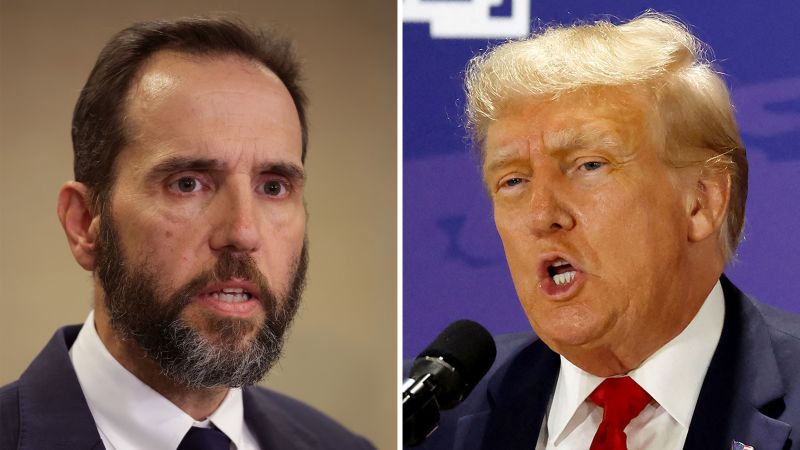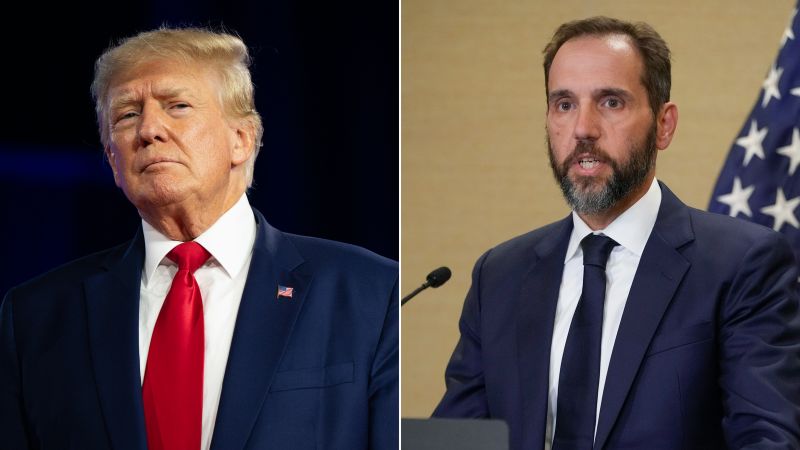
The Supreme Court's Encounter with US v Trump: Impending Political Turmoil

Special counsel Jack Smith's request puts the embattled Supreme Court in a politically charged situation, as they face a former president known for his attempts to manipulate the federal judiciary for his own agenda
Jack Smith, the special counsel, made a request to the Supreme Court on Monday, placing the justices in a highly contentious situation involving a former president who has sought to politicize the federal judiciary for his own purposes. This case not only challenges Smith's federal prosecution of Donald Trump for election subversion but also puts America's highest court to the test.
During the Trump era, the justices were continually embroiled in disputes over his administration's policy and his personal business dealings. Trump's challenges to the rule of law were accompanied by the promotion of conspiracy theories and personal attacks. Chief Justice John Roberts was the target of his vitriol, and when he lost a case, the entire bench faced his ire.
Special counsel Jack Smith and former President Donald Trump
Getty Images
Special counsel takes case directly to the Supreme Court to determine if Trump is immune from prosecution.
The justices rejected unfounded Trump-related claims after the 2020 election, which were aimed at undermining the results that led to Joe Biden becoming president.
The US government, represented by Smith, has urged the justices - six conservatives and three liberals - to take immediate responsibility for determining whether a former president is completely immune from prosecution for crimes committed while in office. The Supreme Court's handling of this case is expected to be closely watched and scrutinized, as public opinion of the justices is at a record low due to controversial decisions and ethics issues.
Five votes are necessary to bypass the appellate level and grant the case directly from a federal trial court. The individual justices are likely to have different opinions about the urgency of the matter, with some having personal connections to Trump. Three of the justices were appointed by Trump, including Neil Gorsuch, Brett Kavanaugh, and Amy Coney Barrett. Another justice, Clarence Thomas, is connected to Trump through the actions of his wife, Ginni Thomas, who supported Trump's bid for re-election in 2020.
Some Democrats are questioning whether Justice Thomas should hear the case, with Senate Judiciary Chairman Dick Durbin and Connecticut Sen. Richard Blumenthal suggesting he should consider recusing himself due to his wife's involvement in trying to overturn the election results. The decision about whether to hear Trump's claim of immunity may ultimately impact the outcome of his trial for election subversion, potentially concluding before votes are cast in a future matchup between Trump and Biden in 2024.
Smith has made a compelling case for the justices early intervention, before a US appellate court addresses the question, so that a scheduled March 4 trial can go forward.
Video Ad Feedback
'This is huge': Reporter breaks down Jack Smith's Supreme Court request
01:03
- Source:
The importance of the constitutional issue surrounding presidential immunity cannot be overstated. Smith has referenced the Supreme Court's 1974 Watergate case and the adage that "no person is above the law" in an effort to persuade the justices to expedite the dispute.
In his petition, Smith emphasized the importance of holding a President accountable for criminal conduct if they abuse the electoral system to stay in power. Trump's assertion of absolute immunity from prosecution was not supported by the Constitution's text, structure, or history. The Supreme Court agreed to expedite the filings at this stage and directed Trump's lawyers to respond by December 20 to Smith's request for the case to be heard.
Trumps anti-justice rhetoric
The Smith's "deranged" actions were promptly addressed by Trump's campaign, portraying his attempt to bypass the appellate process and rush to the Supreme Court as a desperate "Hail Mary."
Trump's continual criticism of the justice system, including judges, has been ongoing since he first ran for president in 2016. This pattern continued after his election, with Trump denouncing judges at all levels of the judiciary whenever they ruled against him. For example, when the Supreme Court refused to hear an unsubstantiated challenge to the 2020 election results, Trump expressed his disappointment on Twitter, saying, "The Supreme Court really let us down. No wisdom, No Courage!"
Former New York City Mayor Rudy Giuliani addresses reporters outside the Merrimack County Superior Court on Wednesday, October 4.
Charles Krupa/AP
Georgia election workers ask court to warn Rudy Giuliani after he repeats claims judge ruled were defamatory
Trump undermined the independence of the justices by inviting them and their spouses to an October 2018 ceremonial swearing-in for Kavanaugh, which was meant to be non-political but turned out to be intensely partisan. When publicly thanking each justice for attending, Trump referred to the assault accusations against Kavanaugh and apologized "on behalf of our nation." In November 2018, Trump criticized a judge who ruled against administration policy, prompting Roberts to defend the judiciary's independence, stating that there are no "Obama judges" or "Trump judges," only dedicated judges doing their best to serve justice equally.
Trump quickly responded on Twitter: "Sorry Chief Justice John Roberts, but there are indeed Obama-appointed judges with a very different perspective than those responsible for our country's safety."
In a recent escalation, Trump has faced judicial gag orders due to contentious remarks in the election subversion case and a civil fraud trial in New York.
However, Trump consistently won in federal court cases, including those brought to the Supreme Court, throughout his time in office. Despite facing challenges, much of his administration's agenda was upheld, and even when he lost battles to keep his personal financial records private, Trump was able to delay their disclosure. Additionally, Trump claimed credit for the 2022 court decision to overturn the landmark 1973 Roe v. Wade ruling, which legalized abortion nationwide. He attributed this reversal to his three appointments to the court, stating, "I delivered everything as promised" in a statement following the ruling.
The 5-4 ruling in Dobbs v. Jackson Women's Health Organization was ultimately decided by Gorsuch, Kavanaugh, and Barrett, with Thomas and Justice Samuel Alito also siding with the majority. With Trump running for the White House once again, there is also the opportunity to continue reshaping the Supreme Court.
Moving quickly for now
The justices now seem to be considering a swift resolution to the presidential-immunity dispute. If they decide that Smith must first present his case in a US appellate court, the process could drag on for months, causing a significant delay in the Trump trial. Trump's legal team contends that his alleged actions related to the 2020 election results were within the scope of his official duties at the time, and therefore he is shielded by presidential immunity.
A spokesperson for President Trump reiterated his claim that the prosecution is politically motivated, stating that rushing the trial is an attempt to harm the President and his supporters. They added that President Trump will continue to fight for justice and oppose the tactics being used against him.
The last private session of the justices was on December 8, and the next in-person session was scheduled for January 5. However, emergency matters like the Smith request can be handled through telephone conference calls and memos.
Former U.S. President Donald Trump, now a Republican presidential candidate, is seen here during a campaign rally at Trendsetter Engineering Inc. in Houston, Texas on November 02, 2023. This marks his second stop in Texas this year. Meanwhile, his sons Don Jr. and Eric testified at his civil fraud trial in New York today, where a judge ruled that he committed fraud in building his real estate empire, potentially leading to the forced sale of his properties.
Brandon Bell/Getty Images
Federal judge says Trump does not have absolute immunity, denying bid to dismiss election subversion case
If the court approves the petition and agrees to hear the case, Smith has requested that both parties submit their opening briefs within 14 days of the case being granted.
The special counsel has modeled his schedule after the 1974 Watergate tapes case, in which the justices promptly heard a dispute regarding then-President Richard Nixon's assertion of immunity from subpoena for White House tape recordings based on executive privilege.
The justices ruled unanimously in July 1974 - 16 days after oral arguments - that Nixon had to comply with the subpoena for tapes of conversations related to the break-in of the Democratic National Headquarters at the Watergate office building. In the Trump controversy, US district Judge Tanya Chutkan rejected his immunity claim on December 1, as well as a double-jeopardy argument that he is constitutionally protected from Smith's prosecution because he was impeached by the US House and acquitted by the Senate.
Smith emphasized the urgency for the Supreme Court, as the ultimate authority on constitutional matters, to address these issues as soon as possible. Given the unprecedented legal challenges and Trump's unpredictability among the justices, the tension and significance could not be greater.

















